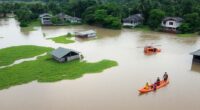In recent weeks, Malaysia has witnessed significant political and social unrest, primarily driven by proposed amendments to key legislation affecting freedom of expression and media independence. Activists, journalists, and civil society organizations have raised alarms over these changes, which they argue threaten the democratic fabric of the nation.
Key Takeaways
- Proposed amendments to the Communications and Multimedia Act (CMA) and the Printing Presses and Publications Act (PPPA) have sparked widespread protests.
- Activists argue that these amendments infringe on freedom of expression and media independence.
- Prime Minister Anwar Ibrahim has called for accountability regarding past governmental decisions affecting national sovereignty.
Proposed Amendments to the Communications and Multimedia Act
The Malaysian government has introduced amendments to the Communications and Multimedia Act (CMA) that have raised serious concerns among civil society groups. These amendments, which were presented in Parliament on December 2, 2024, are seen as a step backward for human rights in Malaysia.
Key issues include:
- Expanded Powers for Regulatory Bodies: The Malaysian Communication and Multimedia Commission (MCMC) would gain unprecedented powers to control and censor information without adequate oversight.
- Increased Penalties: The amendments propose significantly harsher penalties for violations, including fines and imprisonment, raising concerns about disproportionate punitive measures.
- Vague Provisions: Many of the proposed changes contain ambiguous language that could lead to arbitrary enforcement and censorship.
Press Freedom Under Threat
On December 4, journalists and media advocates protested outside the Malaysian Parliament against the proposed amendments to the PPPA. These changes would require digital platforms to register with the government, a move critics argue would stifle press freedom and encourage self-censorship.
The International Federation of Journalists (IFJ) and other organizations have condemned these amendments, calling for a halt to legislation that increases government control over media operations. They emphasize the need for a transparent consultation process involving journalists and civil society.
Accountability for Past Decisions
In a related political development, Prime Minister Anwar Ibrahim has addressed the findings of a Royal Commission of Inquiry (RCI) regarding the Batu Puteh territorial dispute. He described the report as revealing "treachery" against Malaysia, particularly criticizing the previous administration's handling of the issue.
The RCI's report has prompted calls for legal action against former Prime Minister Mahathir Mohamad, highlighting the ongoing political tensions in the country. Anwar's comments underscore the importance of accountability in governance, especially concerning national sovereignty.
Conclusion
The current political climate in Malaysia reflects a critical juncture for the nation, as proposed legislative changes threaten fundamental rights and freedoms. The pushback from civil society and media advocates signals a strong desire for reform and accountability. As Malaysia navigates these challenges, the commitment to uphold democratic principles and human rights will be crucial for its future stability and progress.
Sources
- Malaysia: Halt the repressive amendments to the Communications and Multimedia Act – ARTICLE 19, ARTICLE 19 – Defending freedom of expression and information..
- Malaysia: Proposed PPPA amendments threaten media independence – IFJ, International Federation of Journalists – IFJ.
- PM Anwar: RCI on Batu Puteh report reveals ‘treachery’ against Malaysia, shouldn’t be taken lightly | Malay Mail, Malay Mail.
